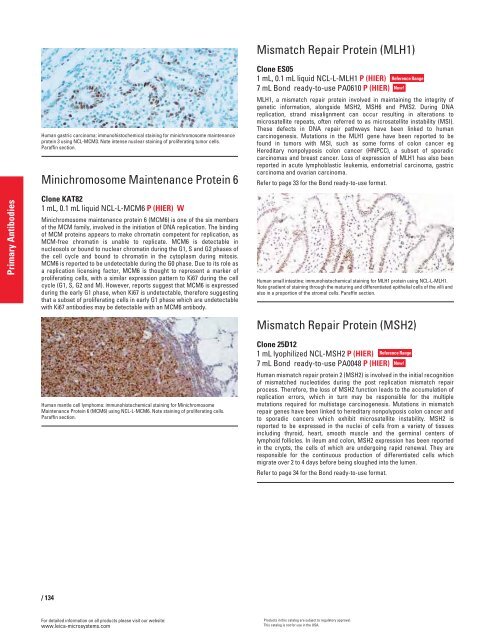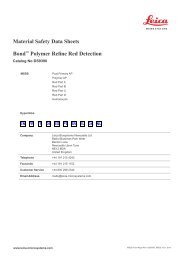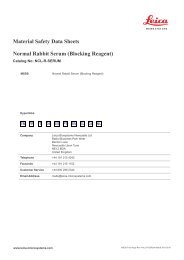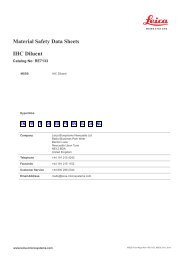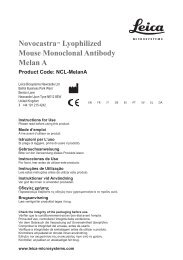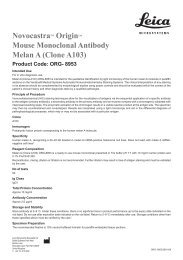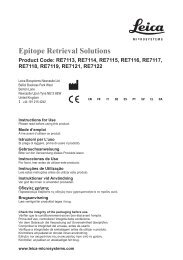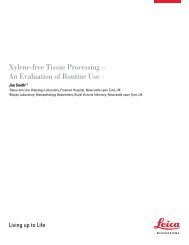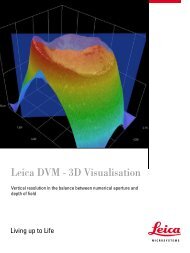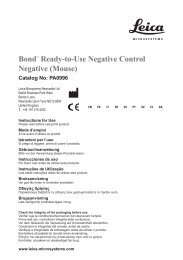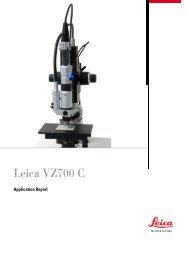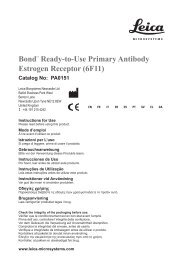Labelling Review row-Online
Labelling Review row-Online
Labelling Review row-Online
Create successful ePaper yourself
Turn your PDF publications into a flip-book with our unique Google optimized e-Paper software.
Primary Antibodies<br />
Human gastric carcinoma: immunohistochemical staining for minichromosome maintenance<br />
protein 3 using NCL-MCM3. Note intense nuclear staining of proliferating tumor cells.<br />
Paraffin section.<br />
Minichromosome Maintenance Protein 6<br />
Clone KAT82<br />
1 mL, 0.1 mL liquid NCL-L-MCM6 P (HIER) W<br />
Minichromosome maintenance protein 6 (MCM6) is one of the six members<br />
of the MCM family, involved in the initiation of DNA replication. The binding<br />
of MCM proteins appears to make chromatin competent for replication, as<br />
MCM-free chromatin is unable to replicate. MCM6 is detectable in<br />
nucleosols or bound to nuclear chromatin during the G1, S and G2 phases of<br />
the cell cycle and bound to chromatin in the cytoplasm during mitosis.<br />
MCM6 is reported to be undetectable during the G0 phase. Due to its role as<br />
a replication licensing factor, MCM6 is thought to represent a marker of<br />
proliferating cells, with a similar expression pattern to Ki67 during the cell<br />
cycle (G1, S, G2 and M). However, reports suggest that MCM6 is expressed<br />
during the early G1 phase, when Ki67 is undetectable, therefore suggesting<br />
that a subset of proliferating cells in early G1 phase which are undetectable<br />
with Ki67 antibodies may be detectable with an MCM6 antibody.<br />
Human mantle cell lymphoma: immunohistochemical staining for Minichromosome<br />
Maintenance Protein 6 (MCM6) using NCL-L-MCM6. Note staining of proliferating cells.<br />
Paraffin section.<br />
/ 134<br />
For detailed information on all products please visit our website:<br />
www.leica-microsystems.com<br />
Mismatch Repair Protein (MLH1)<br />
Clone ES05<br />
1 mL, 0.1 mL liquid NCL-L-MLH1 P (HIER)<br />
7 mL Bond ready-to-use PA0610 P (HIER)<br />
MLH1, a mismatch repair protein involved in maintaining the integrity of<br />
genetic information, alongside MSH2, MSH6 and PMS2. During DNA<br />
replication, strand misalignment can occur resulting in alterations to<br />
microsatellite repeats, often referred to as microsatellite instability (MSI).<br />
These defects in DNA repair pathways have been linked to human<br />
carcinogenesis. Mutations in the MLH1 gene have been reported to be<br />
found in tumors with MSI, such as some forms of colon cancer eg<br />
Hereditary nonpolyposis colon cancer (HNPCC), a subset of sporadic<br />
carcinomas and breast cancer. Loss of expression of MLH1 has also been<br />
reported in acute lymphoblastic leukemia, endometrial carcinoma, gastric<br />
carcinoma and ovarian carcinoma.<br />
Refer to page 33 for the Bond ready-to-use format.<br />
Human small intestine: immunohistochemical staining for MLH1 protein using NCL-L-MLH1.<br />
Note gradient of staining through the maturing and differentiated epithelial cells of the villi and<br />
also in a proportion of the stromal cells. Paraffin section.<br />
Mismatch Repair Protein (MSH2)<br />
Clone 25D12<br />
1 mL lyophilized NCL-MSH2 P (HIER)<br />
7 mL Bond ready-to-use PA0048 P (HIER)<br />
Human mismatch repair protein 2 (MSH2) is involved in the initial recognition<br />
of mismatched nucleotides during the post replication mismatch repair<br />
process. Therefore, the loss of MSH2 function leads to the accumulation of<br />
replication errors, which in turn may be responsible for the multiple<br />
mutations required for multistage carcinogenesis. Mutations in mismatch<br />
repair genes have been linked to hereditary nonpolyposis colon cancer and<br />
to sporadic cancers which exhibit microsatellite instability. MSH2 is<br />
reported to be expressed in the nuclei of cells from a variety of tissues<br />
including thyroid, heart, smooth muscle and the germinal centers of<br />
lymphoid follicles. In ileum and colon, MSH2 expression has been reported<br />
in the crypts, the cells of which are undergoing rapid renewal. They are<br />
responsible for the continuous production of differentiated cells which<br />
migrate over 2 to 4 days before being sloughed into the lumen.<br />
Refer to page 34 for the Bond ready-to-use format.<br />
Products in this catalog are subject to regulatory approval.<br />
This catalog is not for use in the USA.<br />
Reference Range<br />
New!<br />
Reference Range<br />
New!


